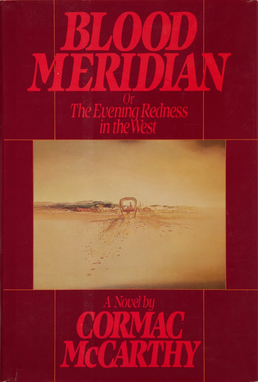Part 10
byPart 10 of Blood Meridian details the continued journey of Glanton and his group as they make their way through the unforgiving terrain of the mountains. The harsh landscape is unforgiving as they gather around fires made from highland driftwood, seeking shelter from the cold of the vast wilderness. The kid, seated cross-legged, repairs his gear with a borrowed awl from Tobin, the expriest. Tobin, who notices the kid’s aptitude for such tasks, points out that while the kid may lack the worldly experience of others, his natural talent shines through in moments like these. Their conversation shifts to the enigmatic figure of the judge, a man who commands both admiration and wariness from the group. The judge is portrayed as a man of great intellect, capable of fluently speaking Dutch and possessing numerous other talents, which Tobin attributes to divine gifts. He remarks that such blessings are not evenly given to men, emphasizing the judge’s unique qualities and setting the tone for the complexities surrounding his role within the group.
As the men continue their work, Tobin delves deeper into the nature of the judge, contemplating whether his numerous abilities are the result of some divine calling. He suggests that even the smallest creature can serve as a vessel for God’s voice, though the kid is skeptical, stating that he has never heard such a voice himself. Tobin, however, remains convinced, asserting that when God’s voice ceases, it will be unmistakable to all. Their conversation reveals a clear contrast between Tobin’s faith and the kid’s pragmatism. While Tobin sees a divine purpose in their actions and their survival, the kid views these moments through a lens of skepticism. The kid’s doubts highlight the rift in their understanding of the supernatural and their struggle to make sense of the inexplicable forces that govern their world.
In the midst of this dialogue, Tobin recalls a pivotal moment when the judge’s unexpected resourcefulness proved essential to their survival. In an environment where every day seemed to bring them closer to death, the judge provided hope when it seemed all but lost. When the group was on the brink of despair, the judge appeared with supplies, offering guns and ammunition that proved crucial to their continued survival. Tobin describes how the judge meticulously collected the ingredients for gunpowder, demonstrating his intellectual prowess and unrelenting determination to keep the group alive. As they navigated through hostile terrain, with Apache warriors closing in on them, the judge’s ability to turn a desperate situation into a victory became evident. By making their own gunpowder and weapons, the group was able to launch an ambush, using their resourcefulness to overcome the threat. This incident highlighted the judge’s critical role in the survival of the group, reinforcing his status as both a protector and a manipulator.
This moment, one of many, underscores the growing significance of the judge in the unfolding narrative. His actions, marked by resourcefulness and intellect, set him apart as a central figure in the group’s dynamics. The judge’s influence, however, is not without its complexities. As the group progresses, they are forced to confront the true nature of the judge’s motivations and power. The brutality of their journey continues, and with each step, the group becomes more entwined with the judge’s presence, unsure of whether to admire or fear him. The line between reverence and fear becomes increasingly blurred, as the judge’s growing authority over their lives shapes the course of their journey. His ability to control the group’s destiny and manipulate their actions speaks to a deeper, darker influence, one that leaves them questioning their own roles in this violent, chaotic world. The judge’s presence becomes an undeniable force, one that cannot be ignored or easily understood, leaving the group to grapple with the moral ambiguity of their situation.

